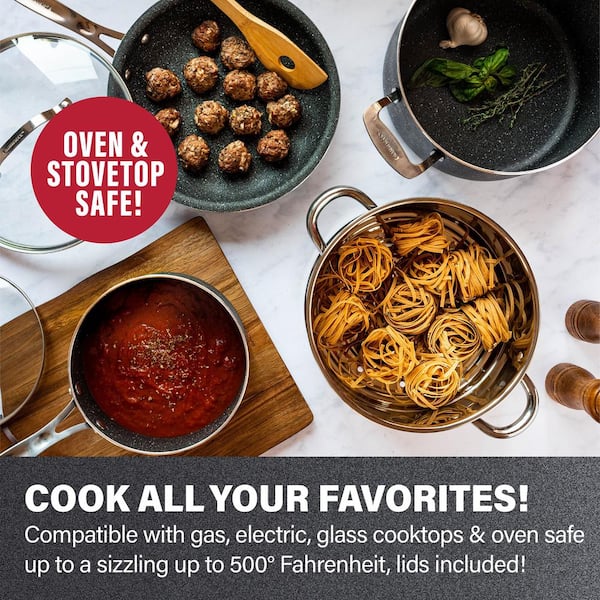Yes, you can safely use granite cookware on a glass cooktop, but important considerations must be made to ensure the longevity of both the cookware and the cooktop.
Granite cookware is popular for its durability and even heat distribution, but it can be heavy and have a rough bottom surface that might scratch a glass cooktop. To use granite cookware on a glass cooktop without causing damage, follow these guidelines:
- Check for Smooth Bottoms: Ensure the bottom of your granite cookware is smooth and flat. Rough or uneven surfaces can scratch the glass. If the cookware is too rough, consider using a protective pad or choosing cookware specifically designed for glass cooktops.
- Avoid Heavy Lifting: Granite cookware can be heavy. Avoid dragging or sliding it across the cooktop to prevent scratching. Instead, lift the cookware carefully and place it gently on the cooktop.
- Regular Cleaning: Keep both the cookware and cooktop clean. Food residues or spilled liquids can cause damage if left untreated. Clean spills immediately to prevent potential issues.
- Check Manufacturer’s Guidelines: Always refer to the manufacturer’s instructions for both your granite cookware and glass cooktop. Some cookware might have specific recommendations or warnings regarding compatibility.
| Aspect | Granite Cookware | Glass Cooktop |
|---|---|---|
| Compatibility | Generally compatible | Compatible |
| Risk of Scratching | Low to moderate | Moderate to high |
| Recommended Cookware Surface | Smooth bottom | Smooth surface |
| Cleaning Recommendations | Regular cleaning | Immediate spill removal |
| Manufacturer’s Guidelines | Check before use | Follow guidelines |

Credit: www.homedepot.com
What is Granite Cookware?
Granite cookware is not actually made of granite but is coated with a layer that mimics the appearance of granite. The core material is usually aluminum or another metal that conducts heat well. This coating is often a combination of enamel and ceramic, designed to be non-stick and durable.
Key Features of Granite Cookware:
- Non-Stick Surface: Easy to clean and ideal for cooking with less oil.
- Durability: Resistant to scratching and chipping.
- Heat Conductivity: Typically made with a metal base that ensures even heating.
Glass Cooktops: Understanding the Surface
Glass cooktops are sleek and modern, offering a smooth cooking surface that is easy to clean. However, they require specific care to avoid damage.
Characteristics of Glass Cooktops:
- Smooth Surface: No burners or grates, which makes cleaning easier.
- Delicate: Prone to scratching and cracking if not handled properly.
- Heat Distribution: Evenly distributes heat when cooking.
Can Granite Cookware be Used on a Glass Cooktop?
Yes, granite cookware can be used on a glass cooktop, but there are some important considerations to ensure safety and maintain the cooktop’s condition.
Pros of Using Granite Cookware on a Glass Cooktop:
- Non-Stick Benefits: Reduces the risk of food sticking and burning onto the cooktop.
- Even Heating: Granite cookware often heats evenly, which can be beneficial for cooking.
Cons of Using Granite Cookware on a Glass Cooktop:
- Weight: Some granite cookware can be heavy, which may cause damage if dropped.
- Potential for Scratches: The bottom of the cookware can scratch the glass if not properly maintained.
Comparing Granite Cookware with Other Types
To help you understand the suitability of granite cookware on a glass cooktop, here’s a comparison with other common types of cookware:
| Cookware Type | Pros | Cons | Suitability for Glass Cooktop |
|---|---|---|---|
| Granite | Non-stick, durable, even heating | Can be heavy, may scratch if rough | Generally suitable with care |
| Cast Iron | Excellent heat retention, durable | Heavy, can scratch if not properly seasoned | Not recommended, heavy and can damage cooktop |
| Stainless Steel | Durable, easy to clean, less risk of scratching | Can be less non-stick, uneven heating | Suitable if the base is smooth |
| Aluminum | Lightweight, good heat conductivity | Can warp or scratch easily | Suitable if base is smooth and cookware is not too heavy |
Guidelines for Safe Use
To ensure the safety of your glass cooktop and granite cookware, follow these guidelines:
1. Check the Cookware’s Base
Ensure that the base of your granite cookware is smooth and flat. This is crucial to prevent scratches on the glass cooktop.
- Smooth and Flat Base: A smooth and even base minimizes the risk of scratching and ensures better contact with the cooktop for even heating.
- Rough or Textured Base: Cookware with a rough or textured base can scratch the glass surface. It’s important to avoid using such cookware on glass cooktops.
- Irregular or Uneven Base: Cookware with an uneven or irregular base can cause both uneven heating and potential damage to the cooktop. Always inspect the base before use.
| Cookware Base Type | Effect on Glass Cooktop |
|---|---|
| Smooth and Flat | Safe for use |
| Rough or Textured | This can lead to uneven heating and potential scratches |
| Uneven or Irregular | Can lead to uneven heating and potential scratches |
2. Clean the Cooktop Regularly
Maintaining a clean cooktop is essential to prevent scratches and ensure optimal performance.
- Use a Soft Cloth: Clean the cooktop with a soft, non-abrasive cloth to remove crumbs or debris.
- Mild Cleaner: Use a mild, non-abrasive cleaner designed for glass cooktops to avoid damage.
- Avoid Abrasive Pads: Never use abrasive pads or scrubbers, as these can scratch the glass surface.
- Glass Cooktop Cleaner: Consider using a cleaner specifically formulated for glass cooktops, designed to be gentle yet effective.
| Cleaning Method | Effectiveness |
|---|---|
| Soft Cloth and Mild Cleaner | Effective for regular cleaning |
| Abrasive Pads or Scrubbers | Can scratch the surface |
| Glass Cooktop Cleaner | Designed to be gentle |
3. Lift, Don’t Drag
Always lift your cookware instead of dragging it across the cooktop when moving it.
- Lifting: Lifting the cookware prevents friction between the base and the glass surface, reducing the risk of scratches.
- Dragging: Dragging can cause scratches and damage to both the cookware and the cooktop.
4. Avoid High Heat
Granite cookware can tolerate high temperatures, but glass cooktops are sensitive.
- Moderate Heat: Use moderate heat settings to prevent damage to the glass cooktop. High heat can cause thermal stress and potentially crack the cooktop.
- Gradual Heating: Gradually increase the heat to avoid sudden temperature changes that can stress the glass surface.
5. Avoid Dropping Cookware
Granite cookware can be heavy, and dropping it can cause damage to both the cookware and the glass cooktop.
- Careful Handling: Handle your cookware carefully to avoid dropping it, which can result in cracks or other damage to the cooktop.
6. Inspect Cookware Regularly
Regularly check your granite cookware for any signs of damage or wear.
- Check for Chips or Cracks: Any damage to the cookware could pose a risk to the cooktop.
- Smooth Surface: Ensure the base remains smooth and free from nicks or imperfections.
Can Granite Cookware Damage a Glass Cooktop?
Granite cookware can potentially damage a glass cooktop if not handled properly. The main concern is scratching the glass surface. Granite cookware with a rough or uneven bottom can cause scratches when dragged across the cooktop. It’s important to use cookware with a smooth, flat bottom to minimize this risk.
How Do You Choose the Right Granite Cookware for a Glass Cooktop?
When selecting granite cookware for use on a glass cooktop, consider the following factors:
- Flat Bottom: Ensure that the bottom of the cookware is flat and smooth. This ensures full contact with the glass surface and helps in even heating.
- Size: Choose cookware that matches the size of the burners on your glass cooktop. Oversized or undersized cookware can lead to uneven heating and potential damage.
- Quality: Opt for high-quality granite cookware from reputable brands. Quality cookware is less likely to have manufacturing defects that could cause damage to your cooktop.
Can You Use Granite Cookware with a Raised Rim on a Glass Cooktop?
Granite cookware with a raised rim is generally not recommended for glass cooktops. A raised rim can cause uneven contact with the glass surface, leading to potential scratching and poor heat distribution. Always check that the cookware has a flat, smooth bottom for the best results.
What Are the Best Practices for Using Granite Cookware on a Glass Cooktop?
To ensure the longevity of both your granite cookware and glass cooktop:
- Use Low to Medium Heat: Glass cooktops are sensitive to extreme temperatures. Using moderate heat prevents damage to both the cooktop and cookware.
- Avoid Heavy Cookware: Heavy granite can put excessive pressure on the glass cooktop, leading to potential cracks or damage. Choose cookware that is not excessively heavy.
- Regular Maintenance: Keep both your cookware and cooktop clean. Residual food and grease can cause sticking or staining.
Can You Repair Scratches on a Glass Cooktop?
If scratches do occur, they can be difficult to repair. Minor scratches might be polished using a glass cooktop cleaner and a soft cloth. For deeper scratches or significant damage, you may need to consult a professional or consider replacing the cooktop.
Are There Alternative Cookware Options for Glass Cooktops?
If you’re concerned about using granite cookware, there are alternative cookware options that are well-suited for glass cooktops:
- Stainless Steel: Cookware with a smooth, flat bottom is ideal. Stainless steel is durable and often designed to be compatible with glass cooktops.
- Cast Iron: Enamel-coated cast iron cookware with a smooth base can work well, but be cautious of its weight and potential for scratches.
- Copper: Cookware with a smooth copper base can also be used, provided it’s specifically designed for glass cooktops.
How Often Should You Inspect Granite Cookware for Glass Cooktops?
Regularly inspect your granite cookware for any signs of damage or wear. Check the bottom of the cookware for rough spots or uneven areas that might harm your glass cooktop. Proper maintenance and regular inspections can help prevent any potential issues and ensure safe cooking.
Final Decision
If proper care is taken, granite cookware can be safely used on a glass cooktop. Ensure your cookware has a smooth, flat base, regularly clean your cooktop, and avoid dragging the cookware across the surface. By following these guidelines, you can enjoy the benefits of granite cookware while protecting your glass cooktop from potential damage.
If you have any further questions about cookware and cooktops, feel free to ask!

I may be a little “crazy” when it comes to cooking, but I enjoy every minute of it. Spending time in the kitchen itself, whether with my family or my friends, brings me both happiness and exhilaration. This blog was created to showcase my cooking/eating with family and friends. And also as an opportunity to discuss ideas on food and the culinary circle in general.